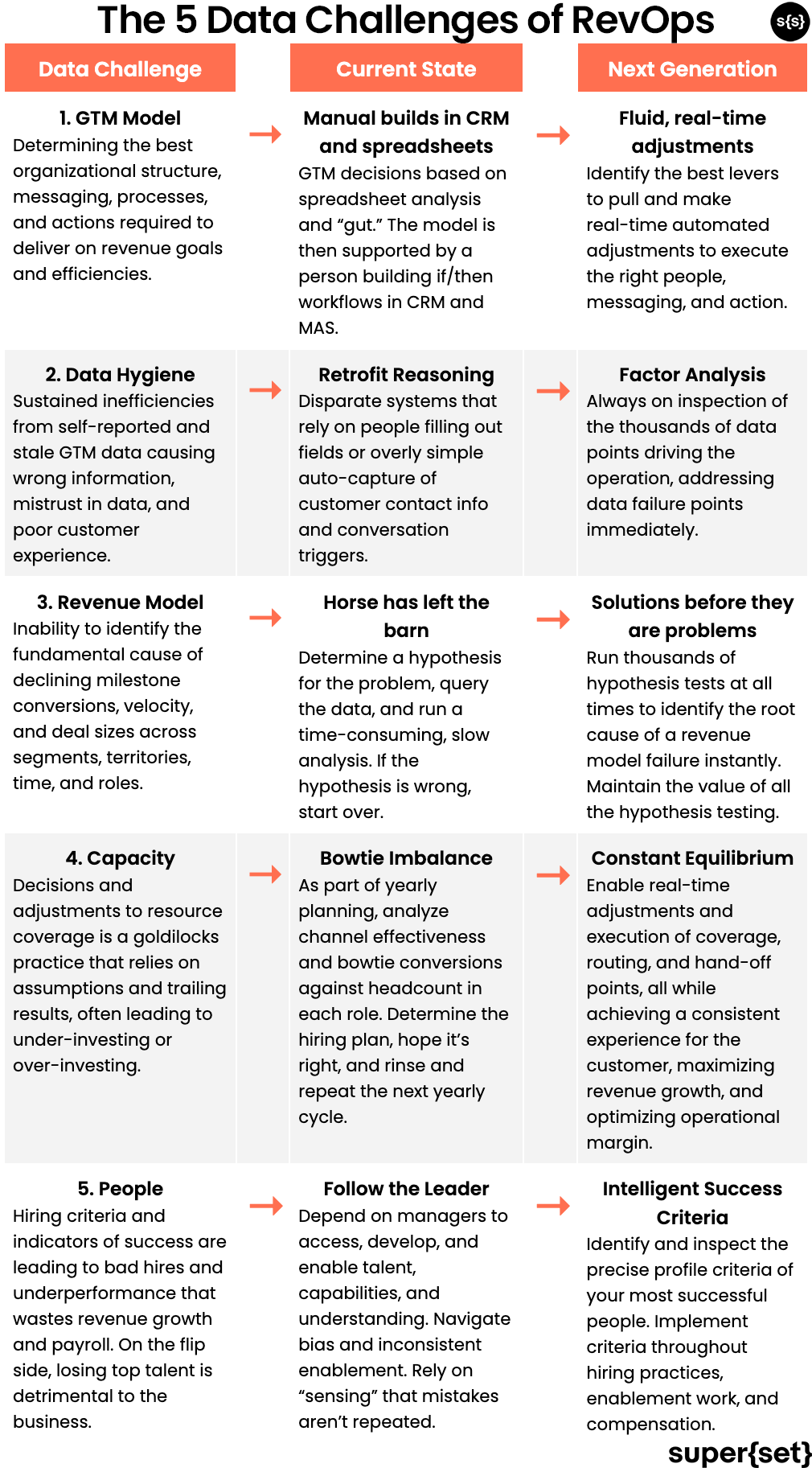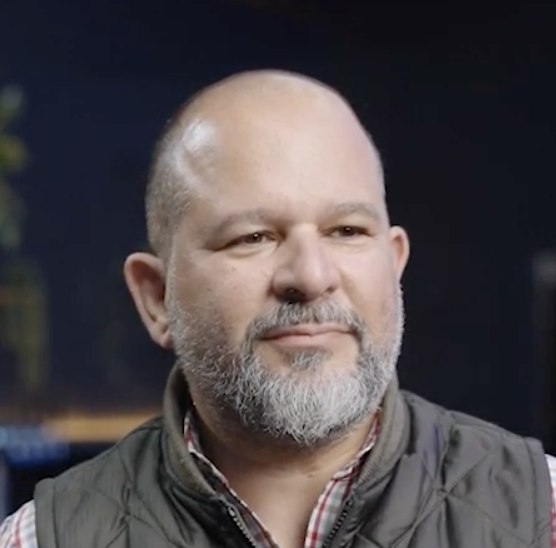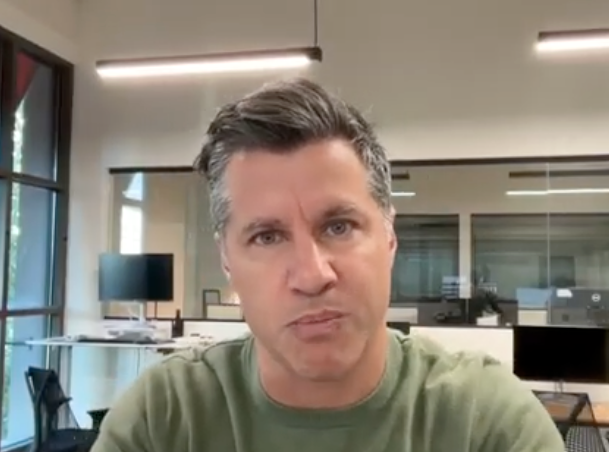
The RevOps Bowtie Data Problem
The RevOps Bowtie Data Problem
At super{set}, the problems we face as founders often inspire us to build solutions.
Our sweet spot - what we call “mac-and-cheese” - are problems that we’ve experienced and can solve through innovation with data. If there’s a solution around generating, capturing, pipelining, orchestrating, analyzing, or activating data - the tools and workflow of data+AI - then we’re the ones to build it.
Not every solution to every problem is worthy of becoming a company - beware of features masquerading as products cosplaying as companies - but many can be, reinforcing the economies of learning across super{set}.
One solution space we have been exploring for the past few months is the emerging field of RevOps, which has emerged from the go-to-market function’s new operating environment and is facing rapid change across consumer, strategic, and operational vectors. RevOps is a space filled with challenges worthy of a venture-backed company with a scalable, profitable business model and the data+AI challenges we solve. Let’s dive in.
Go-to-Market’s New Operating Environment
The information age has unfolded from dial-up into an era of broadband abundance. It used to be that even the enterprise bought software in shrink-wrapped boxes. Today, we buy everything self-serve in just a few clicks. Consumption has changed accordingly: enterprise buyers behave more like the impatient consumers they are outside of work, accustomed to the perquisites of modern life like frictionless check-out, same-day shipping, and immediate access to every movie ever made. With this trend toward the consumerization of the B2B buyer, the littlest bit of resistance in process or funnel hand-offs turns them off immediately, sending them into the hands of competitors.
CRMs once were the single source of truth. No longer - today, 47% of large enterprises believe they can’t rely on their CRM data - and as markets shift, the problem becomes more acute.
In the bull market of the 2010s, as companies grappled with this secular shift in buyer habits, growth could forgive all sins as go-to-market (GTM) teams threw people and dollars at their problems. Businesses could grow without predictable, forecastable, and coordinated capabilities. The operating environment of 2023 has hardened. GTM practices must course-correct to survive by managing good data practices for a unified, optimized understanding of the business and customers:
- Sales requires complete insight and coordination to close deals. More channels to cover and interactions to manage means sales teams are overwhelmed without understanding what information drives the most significant impact.
- Marketing needs a deeper understanding of who buyers are, how they found the product, and why they wanted to buy - throwing money at an expensive ad program to hit an arbitrary marketing qualified lead (MQL) number won't cut it.
- Customer success must connect customers to clear product value to drive renewals and upsells. But what are the right signals, and how does that link to revenue growth?
- Product must inform Go-To-Market teams with usage analytics to improve the coherence between messaging, strategy, and value.
- Customers expect a consistent, valuable, and real-time experience from each stage of their journey and their touchpoints with the company.
The declining value of the CRM as the center of strategy and analytics, accelerated by this new operating environment and the five imperatives around sales coordination, marketing understanding, customer success, customer-oriented product development, and customer experience, is causing a unique role to emerge: Revenue Operations or “RevOps.”
RevOps ties together the GTM functions of sales, marketing, product, and customer success. Practitioners support these roles across both tactical execution and strategy. They help run systems and processes, analyze data, build enablement materials, and develop the strategy that glues GTM teams together.
RevOps is rapidly growing, becoming the #1 fastest-growing job title in January 2023, according to LinkedIn. Yet, the few tools and resources available to this function today make them widely ill-equipped to properly manage the scope of the GTM operations. RevOps will continue to accelerate, disrupting GTM functions for the better, but they can only meet their charter with a new approach.
The Paradigm Shift in GTM
In the introduction, we outlined the secular shift toward abundance that characterizes the information age. With this shift, the value of data is limited only by people’s capacity to make sense of that data and the human foibles that hinder data processing, like poor interpersonal communication. The RevOps role is a product of changing consumer behavior, evolving vendor businesses, and the proliferation of tools creating a data management problem. Three forces are behind this: consumer change, strategic change, and operational change.
1. Consumer Change: Purchasing Software is No Longer Linear
The consumerization of B2B SaaS, often encouraged by product-led growth tactics, has empowered users as purchase decision-makers. The myriad of unique and special snowflake consumers can’t and won’t cram into the classic sales funnel, so companies need technology to personalize the buyer journey automatically. The acceleration of these digital transactions has created new data sources and insights that the GTM space has never had available before.
2. Strategic Change: Revenue Has Become A Bowtie, Not A Funnel
When a hundred flowers bloom, monetization and retention of the existing customer base become far more critical than cramming the top of the funnel. Net Recurring Revenue (NRR) has become more critical than Annual Recurring Revenue (ARR).
Accordingly, vendors have adopted new metrics, like product usage, support escalations, and champion engagement, to determine which existing users top up-sell and cross-sell. Analytics is a post hoc user experience exercise and an ongoing process critical for growth and operating margin.
3. Operational Change: The Proliferation of Tooling - and thus Data
In an earlier era, the CRM was a single source of truth for go-to-market teams, and the CRM was largely manual data entry. Today, tools like Gong, Drift, Clearbit, Heap, and G2 automate data generation.
Similar to consumer change, these tools save the tedium of data entry for sales team members while increasing the number of data points. In other words, there’s not only an increase in the amount of GTM data created through sales automation and enrichment tools but also more tools that need to consume this data, such as AI lead routing, content generation, deal scoring, and website personalization.
It’s a vicious cycle, ironically increasing the value of a complete and single source of truth for go-to-market data that crosses traditional silos.
The RevOps Challenge is a Data Challenge
There is an enormous opportunity to free GTM leaders from bad self-reported data, dashboard fatigue that only highlights problems when their too late, and revenue leakage caused by siloed people, processes, and technology. Finally, the GTM organization can experience data and intelligence transformation with accurate, proprietary information that provides insights and execution for optimal revenue growth.
We described RevOps as covering four areas: 1.) managing GTM systems and processes, 2.) providing enablement, 3.) mining analytics for insights, and 4.) strategizing the big picture across GTM teams. These are all crucial tasks rapidly facing consumer, strategic, and operational change - but they miss the bigger picture. At its core, the root cause of the problem for RevOps is not a mere operations challenge but a data challenge to properly manage the operations. RevOps must be the guardian of the company’s GTM data asset, leveraging that proprietary asset to improve the business, driving alignment and harmony across GTM functions: in other words, programmatically act across the revenue bowtie.
From our experience across super{set} companies and our view of RevOps as a data challenge, first and foremost, we see five solvable data challenges:

Time to Empower RevOps with Data and Intelligence
The RevOps role is quickly maturing and reaching a critical mass. Organizations want their revenue operations function to drive data and technology as a core driver of revenue growth and efficiency. Yet today, it’s unrealistic to expect that vision with the current resources available to manage the GTM operations.
Given their embeddedness within GTM cross-functional teams, solving the challenges of individual RevOps practitioners and teams has leverage for the success of entire companies. The market is shifting: we know from first-hand experience across multiple super{set} companies that the inefficiencies of GTM in the 2010s won’t cut it for companies seeking to survive in the new environment of the 2020s. Now’s the time to solve the RevOps data problem.
Special thanks to Nick Kessler and Lindsey Meyl for all your help with this piece.
Tech, startups & the big picture
Subscribe for sharp takes on innovation, markets, and the forces shaping our future.
Let's keep in touch
We're heads down building & growing. Learn what's new and our latest updates.


